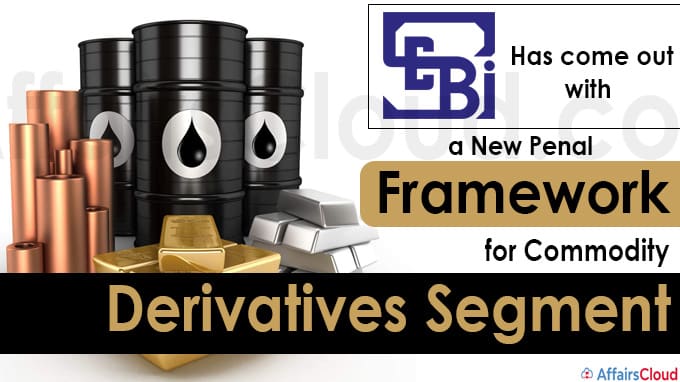
On 23,2021, the Securities and Exchange Board of India (SEBI) along with the Clearing Corporation of India Ltd. (CCIL) framed a new penal structure for the commodity derivatives segment in the event of delivery default.
- In agricultural and non-agricultural commodities, the penalty for delivery default by the seller will be 4% and 3% of the settlement price with replacement cost respectively.
Note – A derivative is a contract between two or more parties whose value is based on an agreed-upon underlying financial asset or set of assets. Common underlying instruments include bonds, commodities, currencies, interest rates, market indexes, and stocks.
- In consultation with CCIL, SEBI came out with delivery default norms, which will be effective from the first trading day of May 2021.
Delivery Default Norms:
Penalty for delivery default by Sellers:
i.For Agricultural commodities
- For futures contracts on agricultural commodities, the penalty on the seller in case of delivery default would be 4% of the settlement price along with replacement cost.
ii.For Nonagricultural commodities
- In the case of futures contracts on non-agricultural commodities, the penalty would be 3% of the settlement price along with replacement cost.
Penalty for delivery default by Buyers:
For both agricultural and non-agricultural commodities
- In the case of default by a buyer, CCIL will review the loss incurred by the non-defaulting party, i.e. seller, at its sole discretion, and accordingly, levy a penalty on the defaulting buyer.
- However, such penalty should be within the overall cap of delivery margins collected by the CCIL, from such defaulting buyer
Norms for apportionment of penalty:
- At least 1.75% of the settlement price will be deposited in the Settlement Guarantee Fund (SGF) of the CCIL, while up to 0.25 per cent of the settlement price may be retained by CCIL towards administration expenses.
- 1% of Settlement Price in case of non-agri goods or 2% of settlement price in case of agri goods) plus replacement cost shall go to buyer who was entitled to receive delivery.
Powers levied to CCIL:
- It will fix the provisions for levy of penalty on delivery default by the buyer
- It has an appropriate deterrent mechanism including penal/disciplinary action in place against intentional delivery default.
- It has the flexibility to increase or decrease the penalty for specific commodities depending on the situation in consultation with SEBI.
- if the average price so determined is higher than settlement price, else this component will be zero
Recent Related News:
In accordance with the Futures Industry Association (FIA), the National Stock Exchange of India Ltd (NSE) remained the world’s largest derivatives exchange for the second consecutive year in 2020 in terms of the number of contracts traded.
About The Clearing Corporation of India Ltd. (CCIL):
- CCIL is authorised and supervised by the Reserve Bank of India under the Payment and Settlement Systems Act, 2007.
- It will provide guaranteed clearing and settlement functions for transactions in Money, G-Secs, Foreign Exchange and Derivative markets.
Establishment – April 2001
Headquarters – Mumbai, Maharashtra
Managing Director – Hare Krishna Jena




